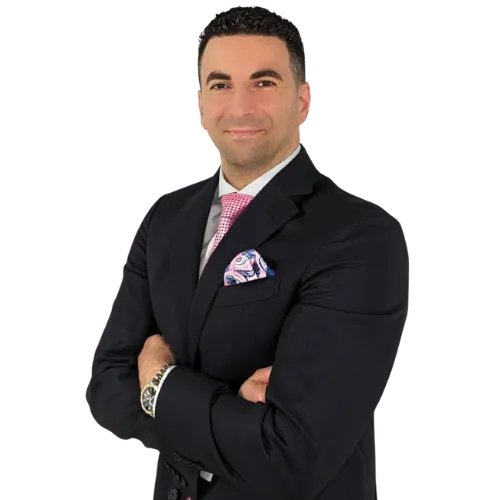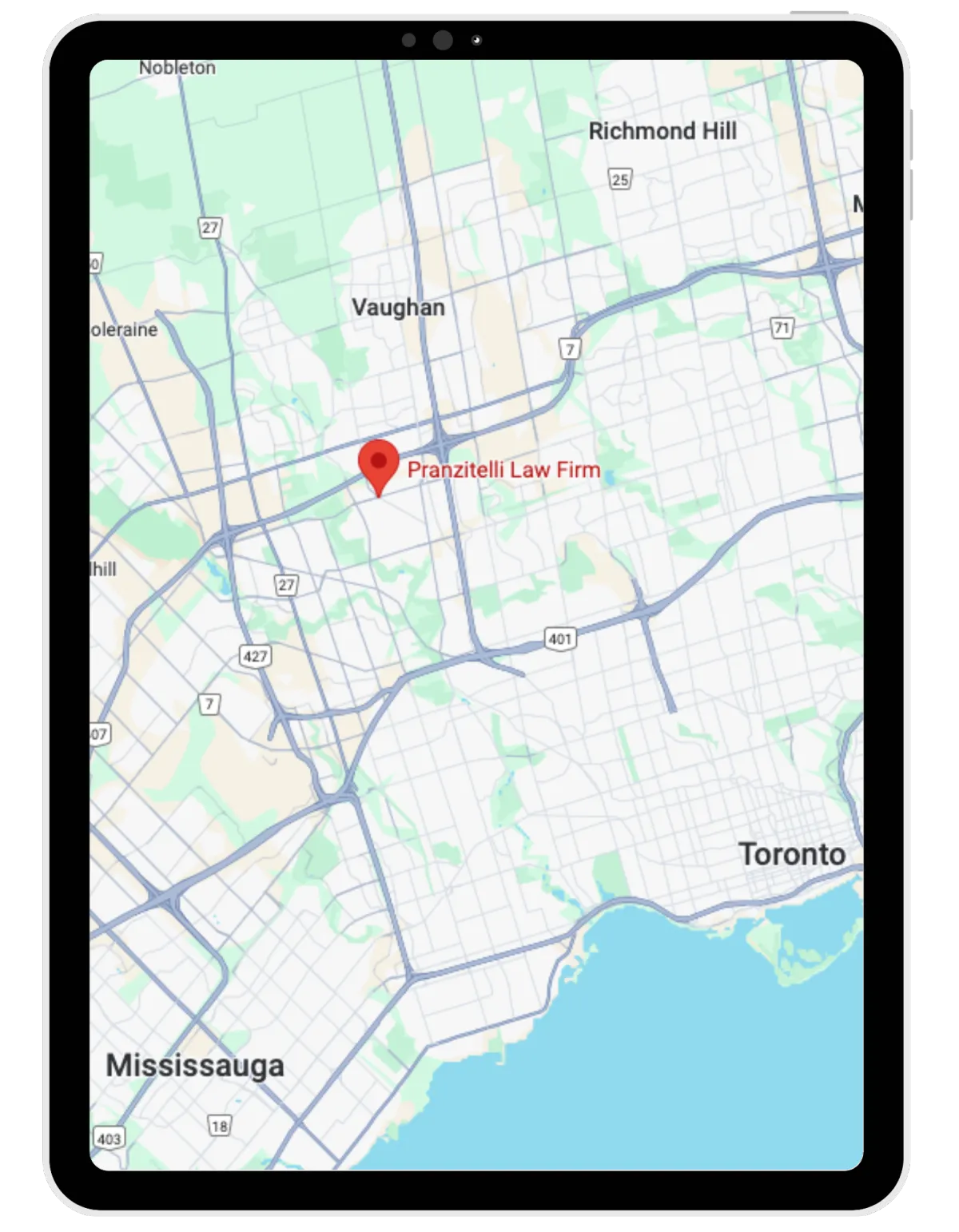The Personal Injury Law Firm Dedicated To Your Success
Over 12 Years In Business | Always A Free Consultation | 100+ 5 Star Google Reviews
Dedicated to Protecting Your Best Interests
Meet Mr. Pranzitelli: Principal Lawyer

Adriano, has dedicated his career to advocating for families and building a firm rooted in trust and excellence. With over 10 years of legal experience, combines legal expertise with a compassionate approach to create a positive impact on the lives of clients. His vision drives our team to consistently deliver exceptional results and client satisfaction.
The Personal Injury Law Firm Dedicated To Your Success
Over 12 Years In Business | Always A Free Consultation | 100+ 5 Star Google Reviews

Tailored Legal Solutions
Every situation is different. We provide tailored solutions to meet your unique needs with clarity, efficiency and trusted expertise

Two Decades of Experience
Pranzitelli Law Firm has over 2 decades of experience. We always fight hard for our clients

Transparent Legal Guidance Clear
Understand every step of your legal journey with detailed, jargon-free advice designed to protect your family’s interests.

Flexible Your Schedule
Offering easy-to-access consultations to ensure your family gets the expert guidance and reliable support it needs, when it needs it.
Dedicated to Protecting Your Best Interests
Meet Mr. Pranzitelli: Principal Lawyer
Adriano, has dedicated his career to advocating for families and building a firm rooted in trust and excellence. With over 10 years of legal experience, combines legal expertise with a compassionate approach to create a positive impact on the lives of clients. His vision drives our team to consistently deliver exceptional results and client satisfaction.
At Pranzitelli Law Firm, we want to be there for you when you need us most. After your accident, we want to ensure that you receive the medical care and attention that you need in a timely manner. We will be with you every step of the way to ensure you can focus on getting better, while we focus on getting you the compensation you deserve. We will assist to ensure you receive the best rehabilitative care possible during your recovery and complete all insurance forms for you so you don’t have to.
Adriano Pranzitelli
Founder Of Pranzitelli Law Firm
Your Trusted GTA Law Firm
Car Accident Claims
You need results-driven representation—a team that ensures you’re compensated not only for your current treatments, but also for the long-term impact and future damages caused by your injury
Denied Long Term or Short Term Disability?
The insurance companies don't play fair. They will do whatever it takes to ensure that they don't have to pay you. If you've been denied LTD or STD for whatever reason. Schedule a free consultation. Our team will fight for you!
Personal Injury
Injured due to someone else’s negligence? You deserve more than just recovery—you deserve justice. Our experienced team will handle the legal fight while you focus on healing. Get the compensation you're owed for pain, suffering, lost income, and future care.
Real Estate Transactions
Buying or selling a home? We make sure your deal closes smoothly and securely. From reviewing agreements to handling title transfers, our team protects your interests every step of the way—so you can move forward with confidence.
Wills & Estate Planning
Your legacy deserves to be protected. Whether you're drafting a will, appointing a power of attorney, or planning your estate, we’ll guide you with care and precision. Secure your future—and your family’s peace of mind.
Other Practice Areas
We offer trusted legal support across a range of matters—because life doesn’t come in one category. From contract reviews to notary services and beyond, our team is here to help you navigate the legal side of life with clarity and confidence.
Your Trusted GTA Law Firm
Here to serve Toronto, Vaughan, Mississauga, Richmond Hill & all surrounding areas


Injured In A Car Accident?
You need results-driven representation—a team that ensures you’re compensated not only for your current treatments, but also for the long-term impact and future damages caused by your injury

Denied Long Term or Short Term Disability?
The insurance companies don't play fair. They will do whatever it takes to ensure that they don't have to pay you. If you've been denied LTD or STD for whatever reason. Schedule a free consultation. Our team will fight for you!

Looking For Help Creating A Will?
A will can be easy to write, especially with AI. However, it is extremely difficult to write well. A will can be contested in the future, which will create problems for your loved ones when receiving the estate.
Empowering Families with Comprehensive Solutions Tailored to Resolve Complex Legal Matters
I Got Hurt & Now I Want To Sue...
Adriano Pranzitelli explains Personal Injury from the point of view of a Personal Injury Lawyer.
Surveillance From Insurance Companies
Adriano Pranzitelli explains how the insurance companies use surveillance to prevent you from getting the compensation that you deserve!
My Disability Claim Was Denied
Adriano Pranzitelli explains what to do when your Long Term or Short Term disability claim has been denied.
If you're disability claim has been denied, it is not the end of the road.
Meet Adriano Pranzitelli
Adriano Pranzitelli explains what to do when your Long Term or Short Term disability claim has been denied.
If you're disability claim has been denied, it is not the end of the road.
Our Services
Car Accident Claims
You need results-driven representation—a team that ensures you’re compensated not only for your current treatments, but also for the long-term impact and future damages caused by your injury
Denied Long Term or Short Term Disability?
The insurance companies don't play fair. They will do whatever it takes to ensure that they don't have to pay you. If you've been denied LTD or STD for whatever reason. Schedule a free consultation. Our team will fight for you!
Personal Injury
Injured due to someone else’s negligence? You deserve more than just recovery—you deserve justice. Our experienced team will handle the legal fight while you focus on healing. Get the compensation you're owed for pain, suffering, lost income, and future care.
Real Estate Transactions
Buying or selling a home? We make sure your deal closes smoothly and securely. From reviewing agreements to handling title transfers, our team protects your interests every step of the way—so you can move forward with confidence.
Wills & Estate Planning
Your legacy deserves to be protected. Whether you're drafting a will, appointing a power of attorney, or planning your estate, we’ll guide you with care and precision. Secure your future—and your family’s peace of mind.
Other Practice Areas
We offer trusted legal support across a range of matters—because life doesn’t come in one category. From contract reviews to notary services and beyond, our team is here to help you navigate the legal side of life with clarity and confidence.
Your Trusted GTA Law Firm
Here to serve Toronto, Vaughan, Mississauga, Richmond Hill & all surrounding areas


Injured In A Car Accident?
You need results-driven representation—a team that ensures you’re compensated not only for your current treatments, but also for the long-term impact and future damages caused by your injury

Denied Long Term or Short Term Disability?
The insurance companies don't play fair. They will do whatever it takes to ensure that they don't have to pay you. If you've been denied LTD or STD for whatever reason. Schedule a free consultation. Our team will fight for you!

Looking For Help Creating A Will?
A will can be easy to write, especially with AI. However, it is extremely difficult to write well. A will can be contested in the future, which will create problems for your loved ones when receiving the estate.
Your Questions Answered
Our Frequently Asked Questions
We understand that legal concerns can be overwhelming. That’s why we’ve compiled answers to the most common questions to help you gain clarity and confidence about your family law case.
What are your "fee's"
For personal injury cases we operate on a contingency fee basis. This means that you don't pay us a dime out of pocket. For other services like wills we offer flat rates and hourly billing
Will more than 1 person work on my case?
At Pranzitelli Law Firm we have a growing team. We collaborate on a case by case basis to provide comprehensive support to everyone whom we work with. The combined skillsets of our three lawyers provides an unmatched level of support.
Are your consultations free?
Yes absolutely! We do not charge you to speak with us about your options regarding your potential case. We encourage you to give us a call, or to come into our office to discuss your options moving forward.
Phone: 905-266-2633
Toll Free: 1-844-757-HURT
4370 Steeles Ave W Suite 16
What is your experience with cases like mine?
Pranzitelli Law Firm has over a decade of experience handling complex legal matters both inside and outside of the courtroom. In addition to Personal Injury, our team has expanded to 3 lawyers. Handling everything from long term disability claims, to uncontested divorce, to wills and estate planning and much more!
My Disability claim was denied...
For both Long Term Disability and Short Term Disability applications and denials - WE CAN HELP!
The insurance companies will do anything to not pay out. It is a business for them. You need a strong team of lawyers on your side to negotiate with the insurance company
If you've been denied Long Term or Short Term Disability. Give us a call or send us a message! Even if its far into your claim.
Will A Lawyer work on my case?
Yes! We currently have a team of 3 experienced lawyers who are directly involved in managing and resolving client matters.
You'll receive personalized attention and guidance every step of the way!
What should I bring to my first consultation?
It depends on the nature of your visit.
You can give us a call before hand to go through all the relevant documents that you need to bring. Or we can go through everything on the phone
905-266-2633
1-844-757-HURT

We strive for Customer Satisfaction. Coming from in-depth understanding of the law and the industry, capitalizing on extensive experience, we provide hands-on advice that speaks the language of our client’s needs. No matter if your case is large or small, we treat your matter with importance, integrity and hard work, your success is our satisfaction.
Our Addresses
(Vaughan | Toronto | London)
Vaughan
4370 Steeles Avenue West, Suite 16
Vaughan, On L4L 4Y4
Toronto
18 King Street East, Suite 1400
Toronto, On M5C 1C418
London
341 Talbot St, Suite 333
London, ON N6A 2R5
Contact Us
(Local | Toll Free | Email)
Local
905 - 266 - 2633
Toll Free
1-844-757-HURT
Email
[email protected]
Toronto | Mississauga | Brampton | Vaughan | Hamilton | Markham | Oakville | Burlington | Kitchener | London
This site is not legal advice. We occasionally use content and information that is prepared by AI. Including but not limited to technology from Gemini, Chat GPT, Grok, Canva, and other technologies from Open AI. Always consult with a lawyer regarding specific legal questions and advice. Give us a call at 905-266-2633 to set up a consultation
Copyright © 2025 Pranzitelli Law Firm | All rights reserved
Your Questions Answered
Our Frequently Asked Questions
We understand that legal concerns can be overwhelming. That’s why we’ve compiled answers to the most common questions to help you gain clarity and confidence about your family law case.
What are your "fee's"
For personal injury cases we operate on a contingency fee basis. This means that you don't pay us a dime out of pocket. For other services like wills we offer flat rates and hourly billing
Will more than 1 person work on my case?
At Pranzitelli Law Firm we have a growing team. We collaborate on a case by case basis to provide comprehensive support to everyone whom we work with. The combined skillsets of our three lawyers provides an unmatched level of support.
Are your consultations free?
Yes absolutely! We do not charge you to speak with us about your options regarding your potential case. We encourage you to give us a call, or to come into our office to discuss your options moving forward.
Phone: 905-266-2633
Toll Free: 1-844-757-HURT
4370 Steeles Ave W Suite 16
What is your experience with cases like mine?
Pranzitelli Law Firm has over a decade of experience handling complex legal matters both inside and outside of the courtroom. In addition to Personal Injury, our team has expanded to 3 lawyers. Handling everything from long term disability claims, to uncontested divorce, to wills and estate planning and much more!
My Disability claim was denied...
For both Long Term Disability and Short Term Disability applications and denials - WE CAN HELP!
The insurance companies will do anything to not pay out. It is a business for them. You need a strong team of lawyers on your side to negotiate with the insurance company
If you've been denied Long Term or Short Term Disability. Give us a call or send us a message! Even if its far into your claim.
Will A Lawyer work on my case?
Yes! We currently have a team of 3 experienced lawyers who are directly involved in managing and resolving client matters.
You'll receive personalized attention and guidance every step of the way!
What should I bring to my first consultation?
It depends on the nature of your visit.
You can give us a call before hand to go through all the relevant documents that you need to bring. Or we can go through everything on the phone
905-266-2633
1-844-757-HURT

We strive for Customer Satisfaction. Coming from in-depth understanding of the law and the industry, capitalizing on extensive experience, we provide hands-on advice that speaks the language of our client’s needs. No matter if your case is large or small, we treat your matter with importance, integrity and hard work, your success is our satisfaction.
Our Addresses
(Vaughan | Toronto | London)
Vaughan
4370 Steeles Avenue West, Suite 16
Vaughan, On L4L 4Y4
Toronto
18 King Street East, Suite 1400
Toronto, On M5C 1C418
London
341 Talbot St, Suite 333
London, ON N6A 2R5
Contact Us
(Local | Toll Free | Email)
Local
905 - 266 - 2633
Toll Free
1-844-757-HURT
Email
[email protected]
Toronto | Mississauga | Brampton | Vaughan | Hamilton | Markham | Oakville | Burlington | Kitchener | London
This site is not legal advice. We occasionally use content and information that is prepared by AI. Including but not limited to technology from Gemini, Chat GPT, Grok, Canva, and other technologies from Open AI. Always consult with a lawyer regarding specific legal questions and advice. Give us a call at 905-266-2633 to set up a consultation
Copyright © 2025 Pranzitelli Law Firm | All rights reserved

We strive for Customer Satisfaction. Coming from in-depth understanding of the law and the industry, capitalizing on extensive experience, we provide hands-on advice that speaks the language of our client’s needs. No matter if your case is large or small, we treat your matter with importance, integrity and hard work, your success is our satisfaction.
Our Addresses
(Vaughan | Toronto | London)
Vaughan
4370 Steeles Avenue West, Suite 16
Vaughan, On L4L 4Y4
Toronto
18 King Street East, Suite 1400
Toronto, On M5C 1C418
London
341 Talbot St, Suite 333
London, ON N6A 2R5
Contact Us
(Local | Toll Free | Email)
Local
905 - 266 - 2633
Toll Free
1-844-757-HURT
Email
[email protected]
Toronto | Mississauga | Brampton | Vaughan | Hamilton | Markham | Oakville | Burlington | Kitchener | London
This site is not legal advice. We occasionally use content and information that is prepared by AI. Including but not limited to technology from Gemini, Chat GPT, Grok, Canva, and other technologies from Open AI. Always consult with a lawyer regarding specific legal questions and advice. Give us a call at 905-266-2633 to set up a consultation
Copyright © 2025 Pranzitelli Law Firm | All rights reserved

We strive for Customer Satisfaction. Coming from in-depth understanding of the law and the industry, capitalizing on extensive experience, we provide hands-on advice that speaks the language of our client’s needs. No matter if your case is large or small, we treat your matter with importance, integrity and hard work, your success is our satisfaction.
Practice Areas
Car Accident Claims
Personal Injury
Wills & Estate Planning
Long Term Disability
Real Estate Transactions
Other Practice Areas
Our Addresses
18 King Street East, Suite 1400 | Toronto, On M5C 1C4
4370 Steeles Avenue West, Suite 16 | Vaughan, On L4L 4Y4
341 Talbot St, Suite 333 | London, ON N6A 2R5
Toronto | Mississauga | Brampton | Vaughan | Hamilton | Markham | Oakville | Burlington | Kitchener | London
This site is not legal advice. We occasionally use content and information that is prepared by AI. Including but not limited to technology from Gemini, Chat GPT, Grok, Canva, and other technologies from Open AI. Always consult with a lawyer regarding specific legal questions and advice. Give us a call at 905-266-2633 to set up a consultation
Copyright © 2025 Pranzitelli Law Firm | All rights reserved

We strive for Customer Satisfaction. Coming from in-depth understanding of the law and the industry, capitalizing on extensive experience, we provide hands-on advice that speaks the language of our client’s needs. No matter if your case is large or small, we treat your matter with importance, integrity and hard work, your success is our satisfaction.
Practice Areas
Car Accident Claims
Personal Injury
Wills & Estate Planning
Long Term Disability
Real Estate Transactions
Other Practice Areas
Our Addresses
18 King Street East, Suite 1400 | Toronto, On M5C 1C4
4370 Steeles Avenue West, Suite 16 | Vaughan, On L4L 4Y4
341 Talbot St, Suite 333 | London, ON N6A 2R5
Toronto | Mississauga | Brampton | Vaughan | Hamilton | Markham | Oakville | Burlington | Kitchener | London
This site is not legal advice. We occasionally use content and information that is prepared by AI. Including but not limited to technology from Gemini, Chat GPT, Grok, Canva, and other technologies from Open AI. Always consult with a lawyer regarding specific legal questions and advice. Give us a call at 905-266-2633 to set up a consultation
Copyright © 2025 Pranzitelli Law Firm | All rights reserved
